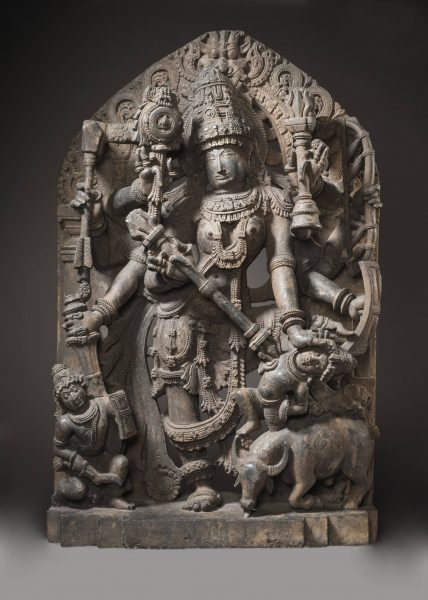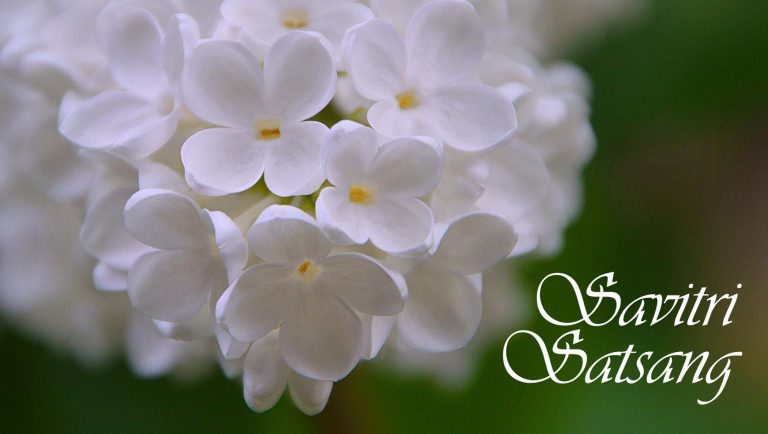 It is against this background that we can understand the story of Goddess Durga slaying the demons along with their king Mahisasura. Mahisasura is the ill-begotten child of the Asura king Rambha and a buffalo-woman. Buffalo is clearly symbolic of an animal type of humanity that is largely tamasic and full of greed and lust. Now Mahisasura, like almost all Asuras covets the treasures and kingdoms of the gods. But he eyes on it with lust and greed rather than the path that is proper for an ascent towards the kingdom of the gods. The proper path is through a sacrifice or the progressive refining and sublimation through purification of the animal energies in us. But the Asura will have none of these. He rises in revolt and wants to storm into the kingdom of heaven not for or through an inner change but for an expansion of his ostentatious empire of lust and domination and control. That is why he is not favoured by the indwelling Universal Godhead Narayana who has to keep the balance of dharma. That is why the Asuras tend to eventually lose sometimes even on the verge of their victory. Sri Aurobindo reveals the subtle difference between these two types of striving:
It is against this background that we can understand the story of Goddess Durga slaying the demons along with their king Mahisasura. Mahisasura is the ill-begotten child of the Asura king Rambha and a buffalo-woman. Buffalo is clearly symbolic of an animal type of humanity that is largely tamasic and full of greed and lust. Now Mahisasura, like almost all Asuras covets the treasures and kingdoms of the gods. But he eyes on it with lust and greed rather than the path that is proper for an ascent towards the kingdom of the gods. The proper path is through a sacrifice or the progressive refining and sublimation through purification of the animal energies in us. But the Asura will have none of these. He rises in revolt and wants to storm into the kingdom of heaven not for or through an inner change but for an expansion of his ostentatious empire of lust and domination and control. That is why he is not favoured by the indwelling Universal Godhead Narayana who has to keep the balance of dharma. That is why the Asuras tend to eventually lose sometimes even on the verge of their victory. Sri Aurobindo reveals the subtle difference between these two types of striving:
God and Titan, Deva and Asura, are indeed close kin in their differences; nor could either have been spared in the evolution. Yet do they inhabit opposite poles of a common existence and common nature. The one descends from the light and the infinity, satisfied, to the play; the other ascends from the obscurity and the vagueness, angry, to the struggle. All the acts of the God derive from the universal and tend to the universal. He was born out of a victorious harmony. His qualities join pure and gracious hands and link themselves together naturally and with delight as in the pastoral round of Brindavan, divine Krishna dominating and holding together its perfect circles. To evolve in the sense of the God is to grow in intuition, in light, in joy, in love, in happy mastery; to serve by rule and to rule by service; to be able to be bold and swift and even violent without hurt or wickedness and mild and kindly and even self-indulgent without laxity or vice or weakness; to make a bright and happy whole in oneself and, by sympathy, with mankind and all creatures. And in the end it is to evolve a large impersonal personality and to heighten sympathy into constant experience of world-oneness. For such are the Gods, conscious always of their universality and therefore divine…..
But the Titan will have nothing of all this; it is too great and subtle for his comprehension. His instincts call for a visible, tangible mastery and a sensational domination. How shall he feel sure of his empire unless he can feel something writhing helpless under his heel, —if in agony, so much the better? What is exploitation to him, unless it diminishes the exploited? To be able to coerce, exact, slay, overtly, irresistibly, —it is this that fills him with the sense of glory and dominion. For he is the son of division and the strong flowering of the Ego. To feel the comparative limitation of others is necessary to him that he may imagine himself immeasurable; for he has not the real, self-existent sense of infinity which no outward circumstance can abrogate. Contrast, division, negation of the wills and lives of others are essential to his self-development and self-assertion. The Titan would unify by devouring, not by harmonising; he must conquer and trample what is not himself either out of existence or into subservience so that his own image may stand out stamped upon all things and dominating all his environment.
In Nature, since it started from division and egoism, the Titan had to come first; he is here in us as the elder god, the first ruler of man’s heaven and earth. Then arrives the God and delivers and harmonises. Thus the old legend tells us that the Deva and the Asura laboured together to churn the ocean of life for the supreme draught of immortality, but, once it had been won, Vishnu kept it for the God and defrauded the fiercer and more violent worker. And this seems unjust; for the Asura has the heavier and less grateful portion of the burden. He begins and leads; he goes his way hewing, shaping, planting: the God follows, amends, concludes, reaps. He prepares fiercely and with anguish against a thousand obstacles the force that we shall use: the other enjoys the victory and the delight. And therefore to the great God Shiva the stained and stormy Titan is very dear, —Shiva who took for himself the fierce, dark and bitter poison first churned up from the sea of life and left to others the nectar. But the choice that Shiva made with knowledge and from love, the Titans made from darkness and passion,—desirous really of something very different and deceived by their stormy egoism. Therefore the award of Vishnu stands; to the God shall fall the crown and the immortality and not, unless he divinise himself, to the proud and strenuous Asura.
CWSA 13: 153 – 155



